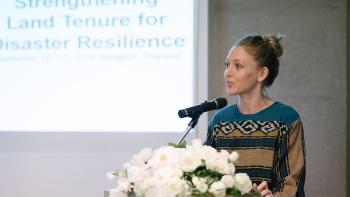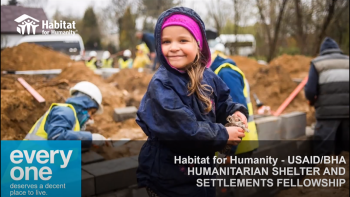Reflection: Humanitarian Shelter and Settlements research fellowship
Program ended March 2025
From 2013 through 2024, the U.S. Agency for International Development Bureau for Humanitarian Assistance, or USAID/BHA, in partnership with Habitat for Humanity International and supported by InterAction, sponsored graduate students through fellowship opportunities, helping boost their research and launch their futures in the humanitarian shelter and settlement sector.
The programs paired Habitat’s expertise in housing with a breadth of sector experience from our partners and funders to offer students a comprehensive learning opportunity.
Research fellowship impact
During its operation, the research fellowship offered graduate students the opportunity to receive professional mentorship, networking opportunities and financial support for research on a humanitarian shelter and settlements topic.
Professional mentorship
- The candidates had the chance to gain firsthand experience and visibility into the work as they completed their graduate studies, helping lay pivotal groundwork for their professional careers.
Networking opportunities
- We provided our fellows with contacts and networking opportunities to develop direct relationships with leading experts from international and national humanitarian organizations.
Financial support
- Fellows received a stipend to assist with graduate research.
Want to learn more? Check out our presentations.
In January of 2023, Habitat-USAID/BHA was proud to receive the final presentations of our 2022 cohort for the Humanitarian Shelter and Settlements Fellowship. In this recording from the presentation, each of our fellowship members presented their research experiences in Peru, Indonesia and Lebanon to a number of InterAction Network Shelter and Settlement experts in Washington, D.C., who provided constructive feedback and dialogue.
In this webinar, 2023 Humanitarian Shelter & Settlements fellow Emily Nabong interviews Melina Holder of the 2022 fellowship cohort. For more information, please visit our Fellowship Resources.
Hear from former fellows
“The fellowship enabled me direct access to shelter and settlement professionals and communities at the field level, which gave me a stronger awareness of how the humanitarian sector operates and where I myself would fit into this system as a young professional.”
“Receiving the fellowship meant that I was able to find housing in the city of my research, which significantly increased my ability to complete full days of fieldwork and to prioritize the research itself, without constantly assessing my research choices against the potential financial implications.”
“The fellowship allowed me to conduct real primary data collection, whereas I would have depended upon my prior work experience and personal impressions otherwise. I could not have afforded to take time to travel to Haiti for my research without this fellowship.”


